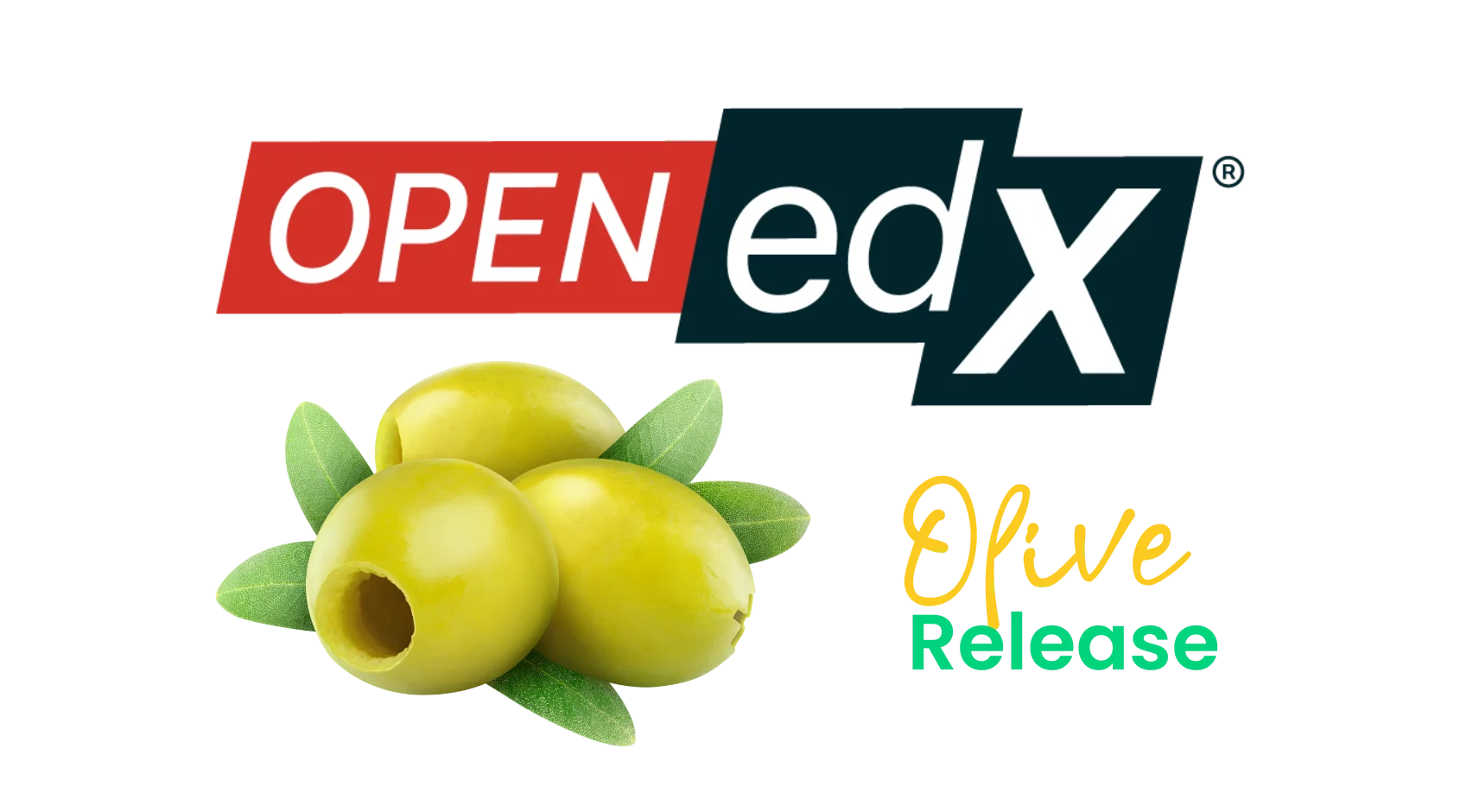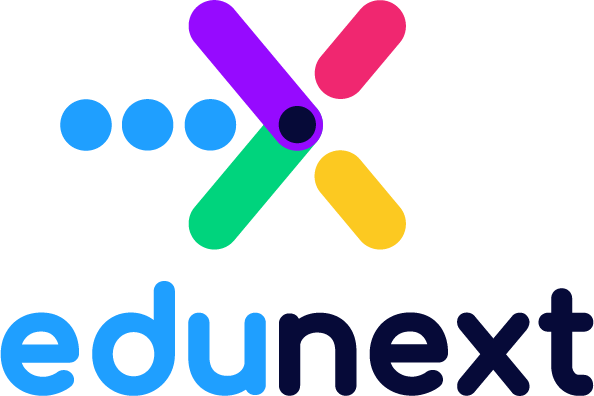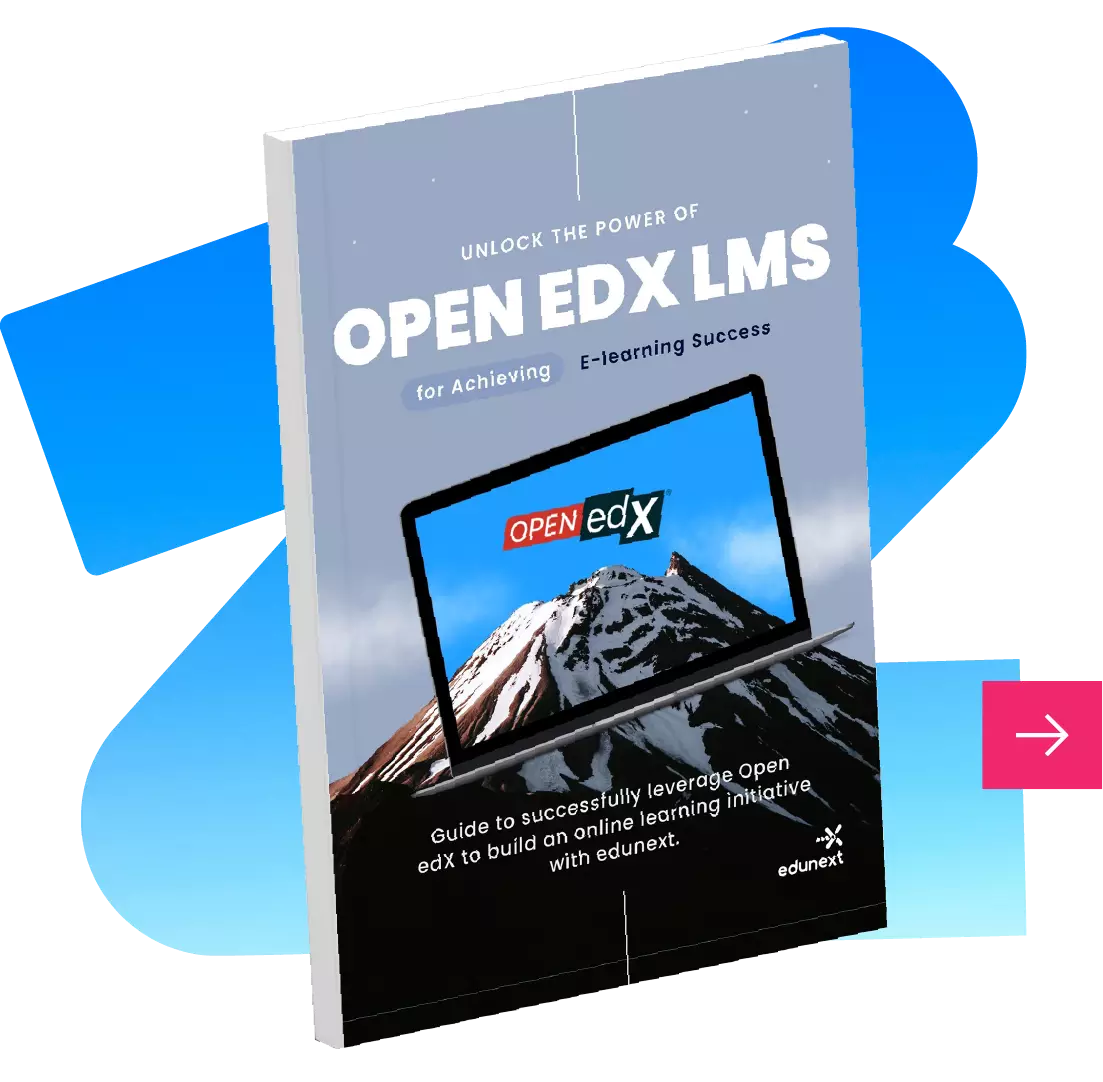Table of Contents
Between April to October 2022, many collaborators from the Open edX community, including edunext, have been developing this platform version: Olive. With great pride and excitement, we now welcome you to this level of Open edX! This version introduces groundbreaking improvements and user-friendly functionality that will elevate the learning experience for all users. Prepare to be amazed as we explore a sleek interface, advanced course search capabilities, and other enhancements that take the Open edX platform to the next level. Experience enhanced performance, security features, better mobile support, and improved scalability. Let’s dive into the new features and discover the possibilities of the Olive release!
— Breaking Changes
All grades are persisted
Open edX incorporates persistent grading as an integral feature, guaranteeing continuous assessment and evaluation of learners’ progress throughout their learning journey. Instructors can consistently monitor and provide feedback on students’ performance, thanks to persistent grading, thus enabling a more dynamic and engaging learning experience. This feature promotes continuous improvement, allowing learners to track their progress and make necessary adjustments to achieve their educational goals.
The persistent rating feature has now become a valuable requirement. These were added as an option in Hawthorne, although they were deprecated in Nutmeg and were enabled by default in Tutor.
If you don’t use Tutor or enable permanent grades, upgrading to Olive will vanish grades from student progress pages and instructor data downloads. To bring back the grades, follow the Migrating to Persistent Grading guide. The duration of the process depends on the number of graded issues and calculation time. It’s better to run the process before the upgrade to prevent any disruption to student progress pages, but running it after the upgrade will still work.

Learning MFE Is Now Required
The Learn MFE (Micro Frontend) generates all learner-oriented course pages, such as course outline, progress page, actual course content, etc. As of this release, the Learning Micro Frontend (MFE) is now mandatory and must be included in your installation. For Tutor, this means installing and activating the MFE plugin.
Previously, the Learning MFE was optional, and users could opt-out. However, this option has been removed since the Maple release (refer to Deprecations & Removals).
MFE Settings Are No Longer Supported in the Tutor Configuration
The recommended way to manage MFE settings is using MFE runtime configuration support. Some MFE variables have been removed – refer to the Upgrade note for specifics.
JWT Access Tokens Expire in 1 Hour
The default expiration time for JWT access tokens is now one hour, down from ten hours.
To give you a better overview of the updates and improvements in this version, we will tell you about the most significant changes for each of the profiles involved in managing your Open edX platform.
— Instructor Experiences
Course Authoring Micro-frontend (MFE)
Pages & Resources
Enabling the Course Authoring Micro-frontend (MFE) feature provides course authors access to the Pages & Resources view from the Content menu, which replaces the previous “Pages” menu item. This interface offers modular settings for various course applications and tools, including Progress, Discussion, Notes, Wiki, Calculator, Custom pages, Proctoring, and Textbooks, depending on which ones are enabled.
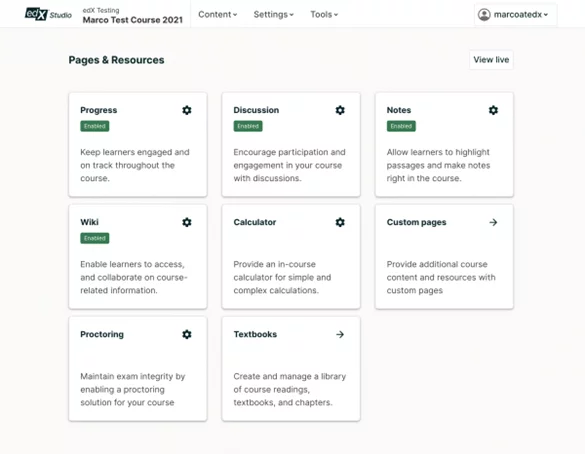
Pages & Resources
The Text Component, previously known as the HTML Component, has been updated to include features that facilitate the inclusion of text and images in course content. The updated editor includes the ability to:
- incorporate special characters and symbols
- undo/redo actions
- the ability to author tables without going into HTML mode
- An easy way to add emoticons.
Refer to the New Text / HTML Editing Experience wiki page for more information.
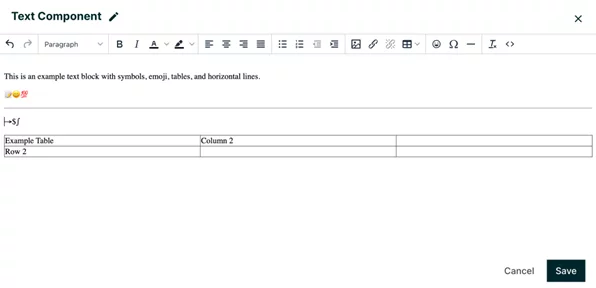
Video Editor
Enabling the new video editor, which is not yet production ready, can be done by setting the waffle flag new_core_editors.use_new_video_editor. This feature is part of the Course Authoring Micro-frontend (MFE) and can be used for experimental purposes.
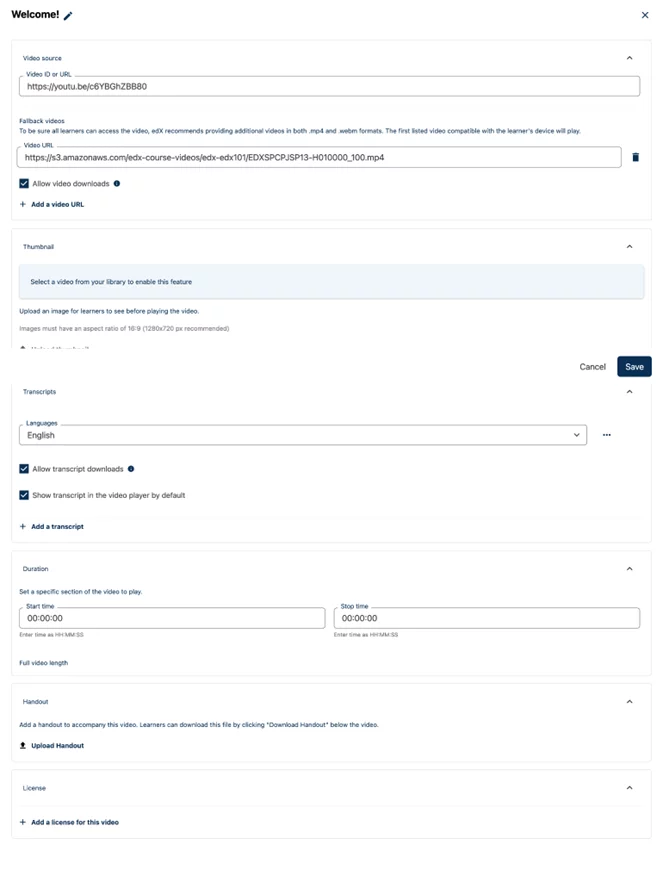
Discussions
Discussion moderators can now opt to receive email notifications whenever any content, such as posts, responses, or comments, is reported. These notifications will be dispatched after the content is reported, and the report remains active for the subsequent 2 minutes.
All the roles with discussion moderation privileges, namely Discussion Admin, Discussion Moderator, Community TA, and Group Community TA, should receive the email. Furthermore, Group Community TAs will receive notifications only for reported content within their cohort.
Other Instructor Experience changes
- Course authors can now enable a reset option for Randomized Content Blocks, allowing students to use them as a problem bank for studying. A video demo showcasing the new user experience is available.
- In Studio, TinyMCE version 4 has been updated to version 5.5.1.
Relevant changes to Tutor are in the Tutor Changelog.
MFE runtime configuration support
In the Nutmeg release, changing a micro-frontend’s settings was a fixed process limited to build time. But with the latest configuration mechanism, you can now modify the MFE’s settings during runtime, both on the server and browser side. Not only is it more convenient, but it also drastically reduces the need to rebuild MFE container images. This is a significant time and resource saver, especially since pre-built images are readily available.
You can enable this optional feature through the ENABLE_MFE_CONFIG_API Django setting in the LMS and configure the runtime settings via MFE_CONFIG and MFE_CONFIG_OVERRIDES variables. Site configuration can also override these settings, with the added benefit of dynamic changes through the backing database.
Upgrade note
Tutor now has, by default enabled, the feature that allows modifying MFE settings during runtime, which is more convenient and reduces the need to rebuild the MFE container images. However, due to this change, a previously supported mechanism for setting some MFE settings through the Tutor configuration is no longer available when upgrading from Nutmeg to Olive.
For further technical details, please refer to this section.
Other Operator Experience changes
- A performance issue that occurs when using multiple themes in a docker environment was fixed using an LRU cache when searching themes.
Features not supported in Tutor.
Although yet to be available in Tutor, several Micro-frontends (MFEs) are currently in a pre-alpha stage, with incomplete features and lacking support for theming, internationalization, and path-based deployments. Nonetheless, these MFEs are listed as they are expected to be fully supported in the next release, Palm. You can check out the GitHub repositories to learn about these upcoming features.
Settings and Toggles
There are new settings and switches added since the launch of Nutmeg, which aims to provide increasingly more accessible configurations and administrative and educational experience. Both settings and toggles that have been removed are available here for you to consult in more detail.
— Learner experiences
Authentication Micro-frontend (MFE)
Open edX Olive offers learners an authentic learning experience through its micro-frontend authentication. It allows learners to log in and access courses with ease. The micro-frontend authentication provides learners with a secure, single sign-on experience. This ensures that their data is kept safe and their course progress is not compromised. The Authentication MFE manages to log in, sign up, and reset passwords. The authentication process is quick and easy and requires no additional setup. Open edX Olive also provides learners with an intuitive and user-friendly dashboard that allows them to manage their course progress without hassle. This makes it easy for learners to keep track of their course progress and complete their courses in a timely manner.
Important Note: You can switch back to the old experience by changing the value of FEATURES[‘ENABLE_AUTHN_MICROFRONTEND’] to False. The removal process for the legacy experiences has yet to begin, but they could be taken away as soon as the next release of Palm.
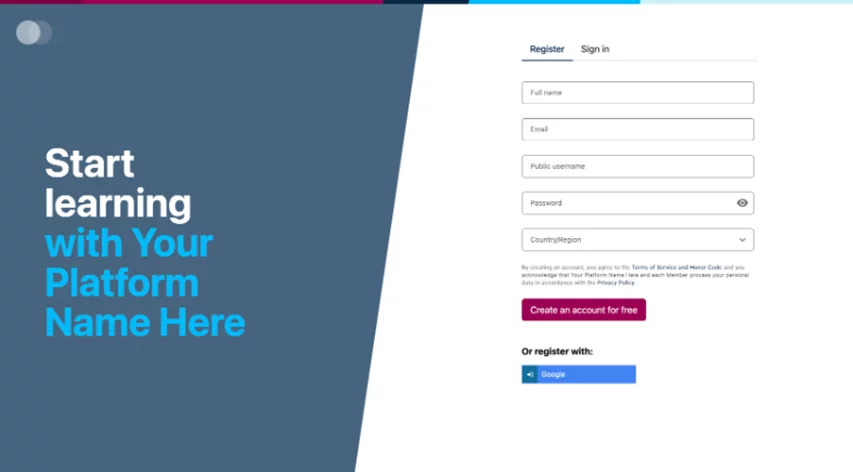
There are some settings that could modify the Authentication MFE experience.
Discussions Micro-frontend (MFE)
The discussion Micro-frontend feature allows developers to create a custom discussion experience for their Open edX courses. This feature is included by default in the Olive release. You can decide which students can see the course discussions using the waffle flag discussions.enable_discussions_mfe. You also need to activate the Course Authoring Micro-frontend (MFE) to set up the course discussions.
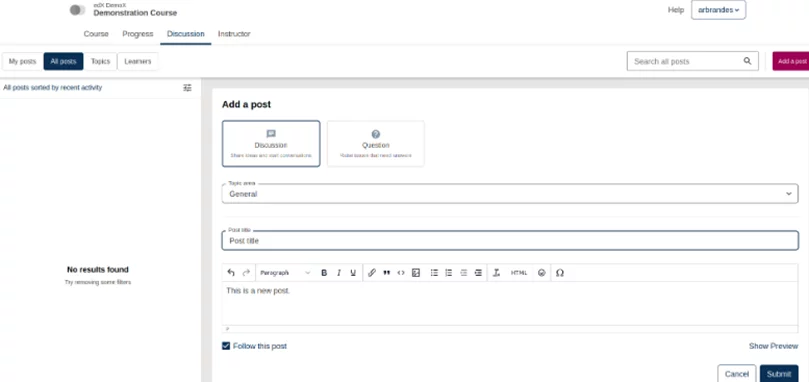
Although the deprecation process for the legacy discussion experiences has not yet begun, they may be removed with the upcoming Palm release.
We have identified inconsistencies between the Discussions MFE (appearing in the Discussions tab) and the in-line discussions, which are caused by the use of different text editors (tinyMCE v5 vs. in-line). Specifically, hyperlinks created in MFE do not appear in in-line discussions, images uploaded in MFE may be absent in in-line discussions, and code formatted in MFE does not appear formatted in online discussions.
Other Learner Experience changes
- Provide a Reset Button for the Randomized Content Block.
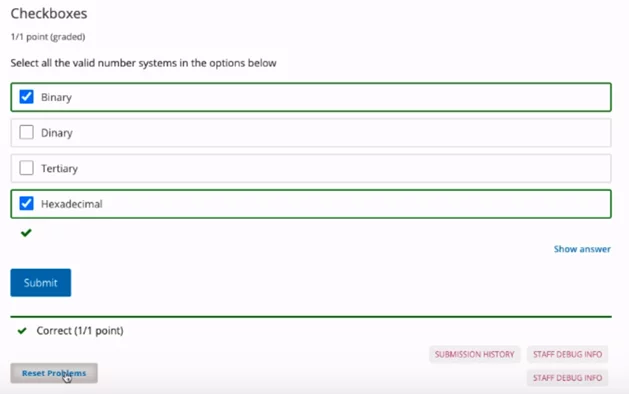
- When live content is enabled, the course page will display a “Live” tab. You can use this feature for services like Zoom or Big Blue Button. To learn more about Zoom integration, please refer to the two blog posts in the wiki, Course-Level Zoom Integration and Program & Degree level Zoom Integration.
— Developer Experiences
Open edX Test Course
This course and its associated libraries aim to simplify the process of testing your Open edX installation. They achieve this by providing examples of various block types and allowing users to take advantage of various features through Advanced Settings. This approach exposes as many Open edX Studio & courseware features as possible.
Hooks Extension Framework
As part of OEP-50, the following filters are in Olive:
- certificate.render.started
- cohort.change.requested.v1
- course_about.render.started
- dashboard.render.started.v1
- certificate.creation.requested
- Recorded data on recommendation course click in analytics, edx.bi.user.recommended.course.click
- Incorporated numerous new conversational occasions, comprising
- edx.forum.thread.edited
- edx.forum.response.edited
- edx.forum.comment.edited
- edx.forum.thread.deleted
- edx.forum.response.deleted
- edx.forum.comment.deleted
- edx.forum.thread.locked
- edx.forum.thread.unlocked
- edx.forum.thread.edited
- edx.forum.response.edited
- edx.forum.comment.edited
- edx.forum.searched
Legacy learner experience
We have replaced the legacy/deprecated learner experience, including the outline, dates, and courseware tabs, with the Learning MFE experience. This means that you now must use Learning MFE to run all tabs. Additionally, any old waffle flags associated with the legacy code have been removed:
course_experience.latest_update, course_experience.show_upgrade_msg_on_course_home, course_experience.upgrade_deadline_message, course_home.course_home_use_legacy_frontend, courseware.microfrontend_course_team_preview, and courseware.use_legacy_frontend.
Legacy OLX attributes translations removed.
You can no longer import courses that use outdated XML attributes. Courses that have attributes such as slug, name in course tags, display_name and id in discussion tags, and attempts in problem tags will not be correctly imported. We recommend exporting and importing the course to update the XML attributes before upgrading. See https://github.com/openedx/public-engineering/issues/74 for more details.
Other removals/deprecations
- The Molecular Structure Problem type was removed.
- The last vestiges of the save option from anonymous_id_for_user are no longer available.
- The Learner View in Insights, Data Pipeline and API are no longer available.
- The frontend-learner-portal-base repo has been archived. Any MFEs that depend on this library have been updated.
- All dependencies on the django-ratelimit-backend library are no longer available.
The following annotations are some of the known issues in the Open edX Olive version:
- The Authentication MFE contains some hard-coded mentioned of edX. We expect these will be fixed by the time Olive.2 is released.
- The Zoom tool is not working. There is currently no plan for when this may be fixed.
- Android app support is limited to Release 3.0.2, while the current release is 3.2.2. Besides bug fixes and translation improvements, customizing video download settings is the only new feature unavailable. (build-test-release-wg#211).
- The default cookie banner has a hardcoded mention of edX. This should be fixed in Olive.2. (build-test-release-wg#146)
- Student notes will load the first time a unit loads but not on subsequent loads. (build-test-release-wg#227)
- When deleting a file in Studio, the “Learn More” link in the warning pop-up leads to a 404. (build-test-release-wg#219)
- Links in the Notes tab must be corrected and linked to the correct unit in the course. (build-test-release-wg#233)
- The dashboard model dialogs for unenrolling and changing email settings do not work. This should be fixed in Olive.2. (build-test-release-wg#228)
- On the instructor dashboard, the text is obscured in some data tables. (build-test-release-wg#223 and build-test-release-wg#225)
At edunext, we understand that upgrading to Olive can be challenging, and we recommend consulting the community documentation to delve deeper into technical aspects. As experts in the Open edX platform, we know that each upgrade requires significant development and configuration.
If you manage your own Open edX platform or need assistance with the upgrade, don’t hesitate to contact us at sales@ednuext.co. We offer a variety of plans that can adapt to any need, from complete platform management to specific technical support. To learn more about how we can help you, schedule a demo with our sales team.
We’re committed to building the future of education with our customers, and we look forward to working with you!

